The Barhabise Development Project ( BDP )
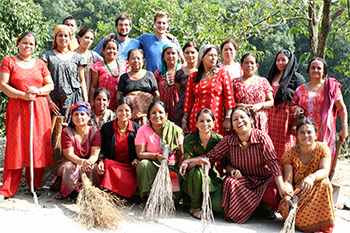 The magnificent mothers of Barhabise pose after ridding Ramche of a year's accumulation of waste.
The magnificent mothers of Barhabise pose after ridding Ramche of a year's accumulation of waste.
In Nepal, twenty kilometers south of the Tibetan (Chinese) border, on the main trade route connecting Lhasa and Kathmandu resides Barhabise, a regional center of five thousand. From the town on the valley floor a number of rural hamlets rise into the foothills of the Himalayas. They are governed by the Barhabise Village Development Committee (VDC) and Ramche VDC. Together, these VDCs govern a complex web of cultures and castes which form the region in which we work, and which we shall refer to simply as Barhabise.
Barhabise is a land of enchanting promise which suffers from mismanaged development and political instability. Even the most basic services such as sanitation and education are lacking due to continuing political strife and the recent ending of an 11 year civil war. Like invisible specters, poverty and ignorance stalk Nepal.
A century of strictly enforced isolationism has been followed by 50 years of political warfare between the proponents of Democracy and the Monarchy. In 2005, for nineteen days millions of Nepalese poured into the streets demanding democracy and at last Parliament wrested control of the army from the King - the office of whom was only formally abolished in Dec. 2007. Today this turbulent nation flounders from lack of leadership and capitol.
We believe that in coordination with international experts on agriculture, education and sanitation we can turn Barhabise into a model from which other Nepalese communities can learn. Our object is to provide the infrastructure and leadership necessary for improvements that are both comprehensive and locally sustainable.
Barhabise presents itself as the ideal location for success because it is one of the few regions in Nepal that has begun the long climb out of poverty on its own initiative. Residents have taken advantage of Barhabise's proximity to the Chinese border to build a strong trade-based economy. Likewise, valley forests are recovering from decades of over-foresting and strip mining, and today thick sub-tropical forests nurture isolated villages, a testament to the strength of the Community Forest (CF) Committees of Barhabise and Ramche VDCs. These past successes and the solidarity of the citizenry have convinced us of Barhabise's potential as a leader and example of sustainable development in Nepal.
Despite Barhabise's successes, the town has by no means elevated above Third World conditions. The wisdom and wealth of Barhabise are impressive only compared to the great poverty and ignorance which plague most of Nepal. Education standards are grossly inadequate as the public school is under-funded, overcrowded and ill-staffed.
As for sanitation, most homes lack toilets and due to the burgeoning population the streets are contaminated with human excrement. Meanwhile, a complete lack of waste management leaves the streets littered and the riverside scarred by impromptu dumpsites.
It doesn't help that the average worker earns a mere $2.50 for a day's labor, and even at this rate unemployment hovers near 50%. Many families rely on subsistence agriculture and simple needs such as eyeglasses and vaccines are beyond their reach.
Our hope is to use your international donations coupled with local resources to implement educational programs, establish public toilets and a waste management system, reduce poverty, and above all to nurture the spirit of civic stewardship.
In this great task we are aided by a growing number of community volunteers and local NGOs. Together we have formed the Barhabise Development Project (BDP) with the ultimate goal of establishing Barhabise as a model sustainable community. Under the direction of a group of highly motivated teachers, students and local leaders the BDP provides the organizational structure through which Barhabise's problems can be identified and fixed.
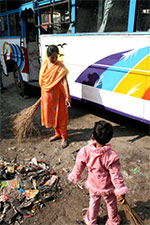 Mother and daughter tackle Barhabise's bus depot during our second town clean-up.
Mother and daughter tackle Barhabise's bus depot during our second town clean-up.
With almost no funding we have laid the foundations of several projects. Public garbage bins have been distributed along the main road to facilitate removal of waste and a network of NGOs has promised support and guidance in the founding of a revolutionary waste processing center. A Community Education Center has been founded and now boasts 12 volunteer teachers leading 22 classes. Community leaders have also donated money and materials amounting to half the cost of our first public toilet. And Lee Brogowski is working to secure the donation of science and computer equipment.
However, we can only progress so far with the limited resources available locally. And without your donations Barhabise cannot develop into a first rate community. These are our goals for Barhabise and we ask for your help.
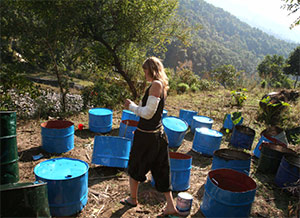 The lovely Vera prepares used oil drums for garbage duty.
The lovely Vera prepares used oil drums for garbage duty.
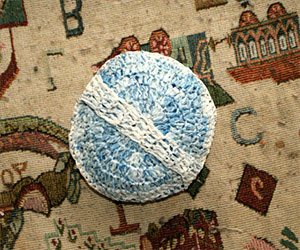 A 100% recycled plastic bath sponge made by Sudeep's mother.
A 100% recycled plastic bath sponge made by Sudeep's mother.
Garbage Program
In Barhabise, residential and commercial waste is simply thrown into the streets where it festers. Eventually an enterprising individual carts it to the Bhote Khosi River where it begins the long toxic trek to the Indian Ocean. We have taken the first steps towards controlling the town's waste. Forty-five 100L and five 200L bins have been distributed along the main avenue. We then staged a town-wide clean-up and two VDC workers have been employed to remove the refuse. Tragically, the waste is still thrown into the river. Land is scarce in the valley and permanent landfills are not an option. We must build a sustainable waste processing center capable of managing the town's growing flow of waste.
Towards this end we are working with several leaders from Nepali organizations with experience in community development and waste management. They include: Megh Ale of The Nepal River Concervation Trust ( NRCT, www.nepalrivers.org.np ), Gujeshwori Shreshta and Sudeep Manandhar of the Society for Urban Poor ( SOUP, soup@ntc.net.np ), and Nripal Adhikari of Abari ( www.abari.org ). They will lead the development of a network of solutions; each aimed at alleviating some aspect of the town's garbage disaster. The main focuses will be construction of a central waste processing facility and neighborhood compost bins, an education campaign aimed at reducing the amount of non-recyclable waste, teaching households to separate waste, improving garbage collection, and training locals to re-use plastic waste at home or in cottage industry.
This project will require:
- Expert consultation.
- Construction of separation and storage facilities, an incinerator and neighborhood composting bins.
- Purchase of addition 100L bins for expansion of garbage collection into alleys and neighboring villages.
- Purchase of home bins for in-house separation of waste.
- Covering open sewers to prevent the accumulation of waste.
- Training villagers to re-use plastics.
Projected Cost: $10,000
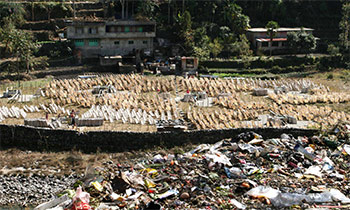 Old Tiger's paper factory lies across the Bhote Koshi from one of Barhabise's impromptu garbage dumps.
Old Tiger's paper factory lies across the Bhote Koshi from one of Barhabise's impromptu garbage dumps.
Public Toilets
Barhabise reeks from lack of public toilets. Behind truck stops and in neighborhood alleys, travelers and the local poor pollute the ground for want of a better option. Human feces seeps into town water ways and creeps into homes on the soles of shoes, increasing the threat of diseases such as Hepatitis A. From a cultural aspect as well, this problem is highly disturbing. Hindu culture places a high value on female decency. And so women must steal into the cold darkness before sunrise or after sunset when they can feel some modicum of privacy.
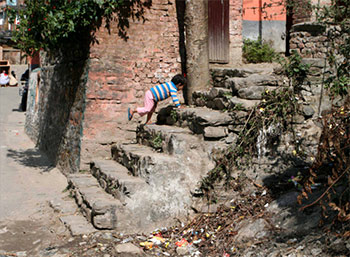 A girl plays above an open latrine.
A girl plays above an open latrine.
The problem derives from three sources, a lack of toilets in the houses of the poor, a steady influx of truckers trading between Kathmandu and Lhasa, and the town's importance as a weekend destination for Kathmandu tourists and local villagers. Fortunately Barhabise's linear layout lends itself to public facilities. By building a total of five public toilets we can guarantee easy access to the town's poor and visitors. The effect will be immediate and profound; less disease, purification of the air and water, and privacy for the town's poor.
This project is of particular importance to the women's organizations of Barhabise and Ramche VDCs. Because of their support we have access to free and reduced cost construction materials and volunteer laborers. Nonetheless, this project will require certain expenses. These include: Employment of a master carpenter and plumber. Purchase of fixtures, cement, metal parts, doors, plumbing, wiring, and roofing. Purchase or lease of land for two of the five projected toilets - land for the remaining toilets will be donated.
Projected Cost: $5000
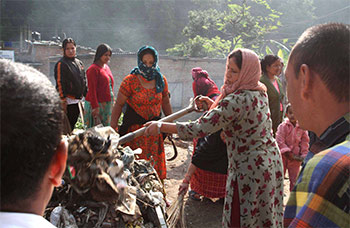 Bagwani Thapa removes stagnant sewage from road-side gutters while men watch.
Bagwani Thapa removes stagnant sewage from road-side gutters while men watch.
Community Education Center
In January 2008 we launched the Barhabise Community Education Center (BCEC) in a building lent us by Private Paradise Boarding School. Demand was intense with mothers, school children and manual laborers crowding the gates of our solitary classroom. Before the first week of classes ended we abandoned the campus and relocated to Arniko College where four classrooms have been made available. This has allowed us to expand our services to meet the overwhelming demand.
At BCEC we teach English, Nepali script, science, music and chess. English, and education in general, is viewed as the gateway to a better life and young men dream of employment at a call center, heckling Americans for their Social Security Numbers. This we do not support. Nonetheless, the importance of the Center as an outlet for free education cannot be overemphasized.
Many Nepalese have only the barest access to education and never develop the capacity to evaluate and overcome everyday problems, which we value so dearly in America. More than merely teaching English or science, we are teaching Barhabise's residents how to learn - an ability which is underdeveloped in Nepal.
Unfortunately our staff of volunteer teachers must make due with their wits until we can provide them with the materials necessary for a modern education. Your support will allow us to purchase books, dictionaries, scientific equipment and an array of learning tools.
Projected Cost: $1,000 School Science and Computer Lab
School Science and Computer Lab
Several years ago a Japanese organization constructed a building to serve as a science lab for the Shree Sharada Higher Secondary School (SSHSS) of Barhabise VDC. Today that lab remains devoid of equipment and students continue to learn purely theoretical science from their text books. In partnership with the school Head Master and science instructor, we hope to introduce a curriculum that is 75% theory and 25% practical application. Without access to practical science the students are unable to develop an understanding of the scientific method. Instead, they learn to view science as a mere compilation of memorizable information. Later in life, they suffer from an inability to problem solve - a deficiency that is all too evident in Nepal's stagnant political and economic spheres.
Because of the close relationship between modern science and computer technology, we will also outfit a computer lab. Students have no access to computer technology and are at a severe disadvantage upon entering university or the job market. With the help of Lee Bergowski we have located a potential donor of science and computer equipment in America. We now need the funding to ship the materials to Nepal and to purchase materials we were unable to receive through donations.
When complete, this project will turn SSHSS into a regional center of scientific inquiry. In addition to the basics of physics, biology, chemistry and ecology we will emphasize agricultural science, for which there is a specific regional need. In order to maximize the science lab's impact, local private schools and public schools located in the hills surrounding Barhabise will be encouraged to use the facility. In addition, bi-yearly science fairs and scholarships will motivate individual students to excellence.
This project will require:
- Laboratory equipment donated from American and shipped to Barhabise or purchased in Kathmandu.
- Nine computers with education and word processing software.
- Teacher training in practical application of scientific principles and computer literacy.
Projected Cost: $4,000
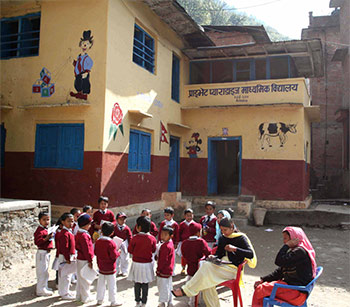 Children sing nursery rhymes in front of our first Community Education Center, donated by Private
Paradise Boarding School.
Children sing nursery rhymes in front of our first Community Education Center, donated by Private
Paradise Boarding School.
Agricultural Research Garden
Accompanying the increased emphasis on practical science, we plan to build a research garden, to be designed and maintained by the students of local schools. The majority of the students hail from poor families who rely on small-scale agriculture. Unfortunately, farming in the region suffers from a lack of innovation. Families use inefficient practices and fields lie fallow for the dry five months of every year due to an absence of effective irrigation. Because many families rely exclusively on personal agricultural production for their diet and income, an increase in productivity will have an enormous impact on health and economic wellbeing.
While working at the Garden, students will develop the practice of experimentation and begin to take a personal interest in scientific inquiry. Experiments in crop differentiation, farming techniques and irrigation will allow local families to improve normal crop yields and begin to plant during the dry season. The addition of new crops will improve the variety of local diets. Because poor families currently rely upon their personal production of simple starches, diets are generally deficient in vitamins and protein.
This project will require:
- Lease of two acres of neighboring land from the Barhabise CF.
- Purchase of tools, seeds, and diverse irrigation apparatus.
- Teacher training and student / teacher field trips to regional production centers.
Projected Cost: $2,000
Community Sports Facilities
In partnership with SSHSS we will develop a community sports park complete with a cricket pitch, basketball court, and a volley ball court. Team sports provide an important opportunity for young boys and girls to develop teamwork skills and gain self-confidence, yet they are wholly lacking in Barhabise.
Of particular importance in this project is the empowerment of young women. According to the United Nations Development Foundation, Nepal ranks a miserable 127 out of 140 for economic, political and educational opportunities for woman. Despite a recent rise of love marriages, arranged marriages still account for about 90% of matrimonies. Women remain household laborers and child bearers with little chance for intellectual, political or social growth. Education experts agree that youth athletics endow self assertiveness to women in societies which marginalize female participation. We hope that the exercise of young bodies can help build strong wills, and eventually a more egalitarian society.
The park will be located on the SSHSS campus where it will be used during school hours for gym class. After hours community members will have access to park facilities and equipment, which will be managed by the school librarian.
This project will require:
- Construction of two basketball hoops, a volley ball net, and a cricket pitch.
- Purchase of related equipment and uniforms.
Projected costs: $1,000
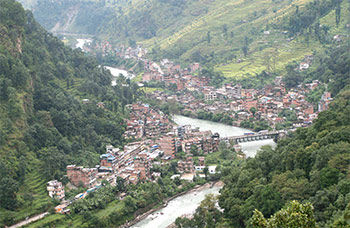 Barhabise!
Barhabise!
You can help the people of Barhabise in their noble struggle to free themselves from the curse of poverty. What, to you, is a small donation can have a colossal impact upon the quality of health, education and employment in Barhabise. Please donate, and thank you!
For more information about the project, please contact the organizers:
Chris O'Connell
handsofschiele@gmail.com
Erik Walenza-Slabe
ewalenza@gmail.com
All Contributions are 501(C)(3) tax-deductible and should be made out to
The Little Wings Foundation and sent to the
following address:
The Little Wings Foundation / Barhabise
c/o Lindley Pless
300 East 75th Street
Apt 34A
New York, NY 10021
If you have questions about donating or would like to make a contribution,
you may contact the fundraising coordinators:
USA East Coast: Lindley Pless
lindley@tilghman.net
USA West Coast: Susan Walenza
swalenza@gmail.com
